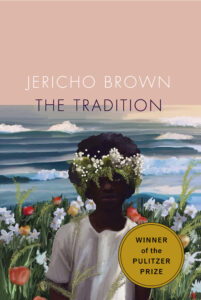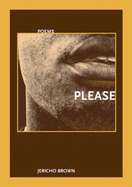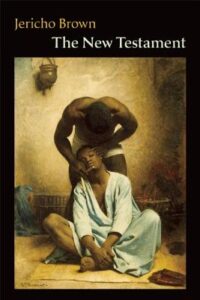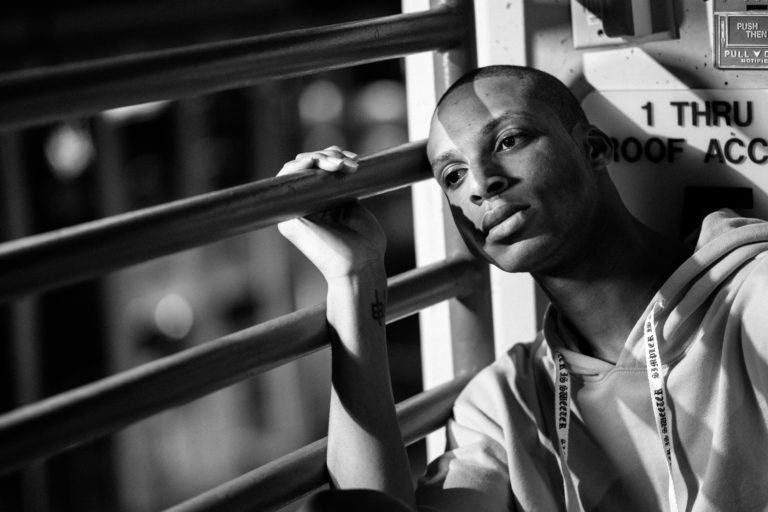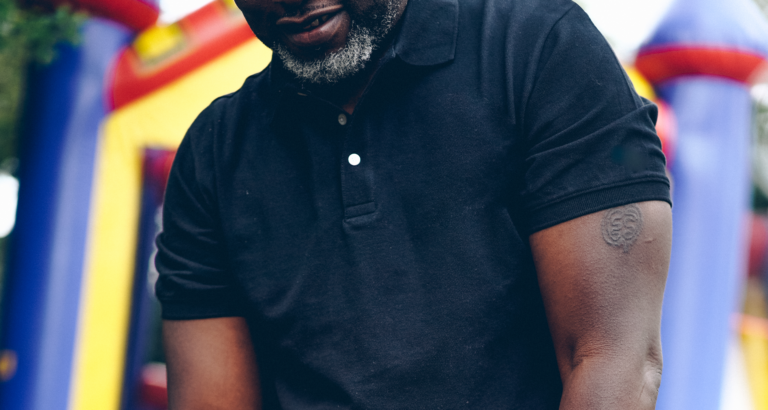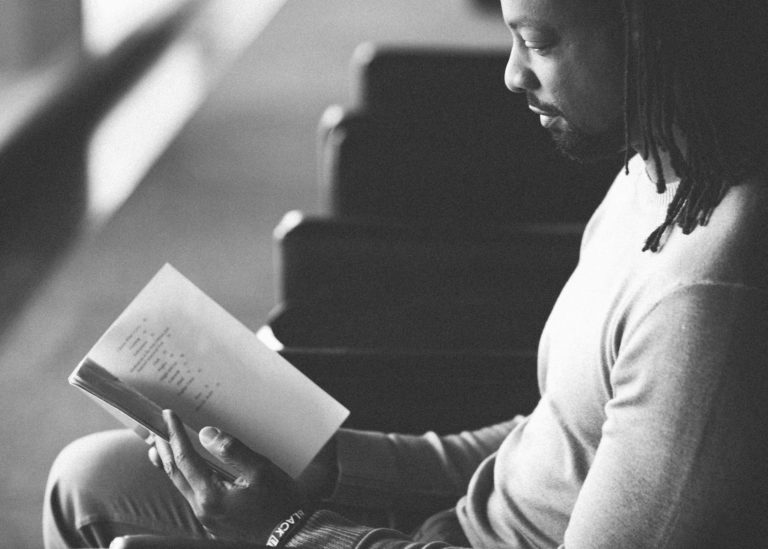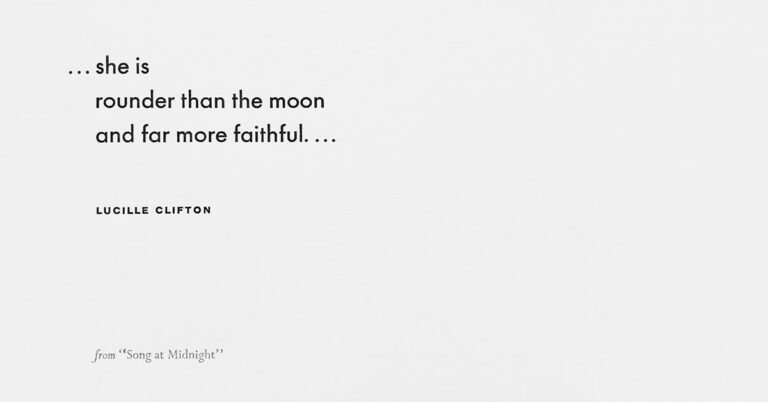Jericho Brown
Small Truths and Other Surprises
The poet Jericho Brown reminds us to bear witness to the complexity of the human experience, to interrogate the proximity of violence to love, and to look and listen closer so that we might uncover the small truths and surprises in life. His presence is irreverent and magnetic, as the high school students who joined us for this conversation experienced firsthand at the 2018 Geraldine R. Dodge Poetry Festival. And now he’s won the 2020 Pulitzer Prize for Poetry.
Editor’s note: This interview discusses sexual violence and rape.
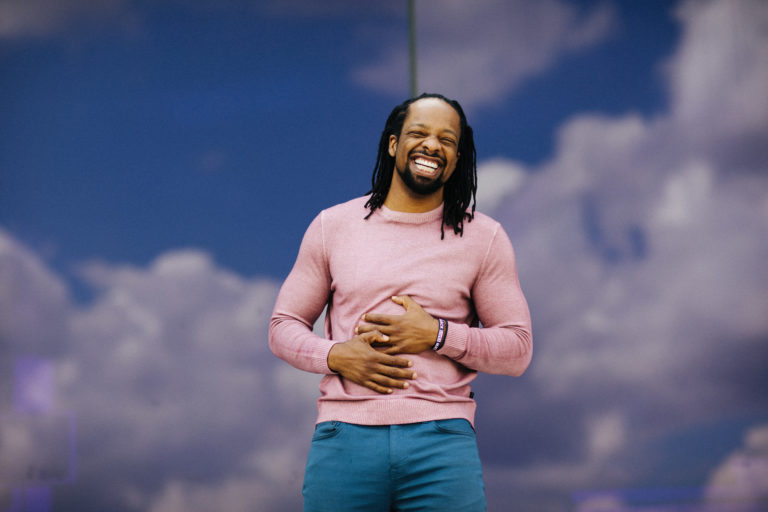
Image by DEEN, © All Rights Reserved.
Guest
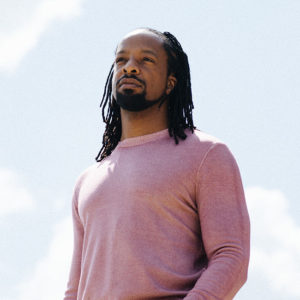
Jericho Brown is the Charles Howard Candler Professor of English and Creative Writing at Emory University, where he also directs the university’s creative writing program. His books of poetry are The New Testament, Please, and The Tradition, for which he won the Pulitzer Prize in 2020.
Transcript
Krista Tippett, host: Jericho Brown is beloved in the worlds of poetry and education. And now the book he was writing when we spoke, The Tradition, has won the 2020 Pulitzer Prize for Poetry. We had an audience of Newark high school students for this conversation — ranging from the proximity of violence and love, the complexity each of us is, and small truths and the surprises they bring. Plus it was fun to read Jericho’s own words back to him.
[music: “Seven League Boots” by Zoë Keating]
Tippett: “Only the creative mind can make use of hope. Only a creative people can wield it.”
Jericho Brown: Come on, creative people. I got some creative people out there, yes, God.
[applause and laughter]
Tippett: I’m Krista Tippett, and this is On Being.
Jericho Brown is associate professor and the director of the creative writing program at Emory University. We recorded our conversation onstage at the 2018 Geraldine R. Dodge Festival — where we were introduced by the Dodge Foundation’s program director, Martin Farawell.
[applause]
Tippett: So here’s some of what Martin first wrote to us in the invitation he sent to be part of this. He said, “I think poetry evolved to save us from ourselves. It questions our understanding of what it means to be human and, in the process, deepens our humanity. History teaches us — and the daily news reminds us — how easily we forget what it means to be human. Probably no other art form is better than poetry at getting us directly inside another’s mind, experience, perspective. The ability to imagine someone else’s inner life is where compassion begins.” And he said, “We could certainly use more of that nowadays.” Amen. [laughs]
I am also personally grateful for this invitation because it has introduced me to Jericho Brown — to his person and his poetry. I have some poems that I’ve marked, but if you, in the course of the next hour, just feel called to stand up and read a particular poem, you are warmly invited to do so.
Brown: Do I have to stand up?
Tippett: No, you can sit. [laughs]
You grew up in Shreveport, Louisiana? I begin many of my conversations with a question about the religious or spiritual background of someone’s early life, their childhood, and also the origins of the passions and questions that drive them. And it seemed to me, as I started exploring you, that some of the convergence of your story of growing up in church, in the Black Baptist Church, and also, what becoming a poet meant to you — some of that story is wrapped up in the name you chose as an adult, that Jericho is not the name you were born with.
I wonder if you would reflect on that. Do you think that’s true, to say that those things come together in your name?
Brown: Maybe so. I think one thing that I love about being a poet is that I know that I was prepared for it in every way possible, and one of the ways that I was prepared for it is growing up in a black church. And when I say “growing up in a black church,” I mean, people really went all the way toward pageantry and toward drama and toward what they were going to wear. Everything they could possibly give it, they gave to being in that moment. And the energy in that church, the energy in that sanctuary, was always high, and everyone was aware that they were doing it, that the energy was high energy because we were making it high energy with our song, with the way we spoke, with the way we moved. Many of you have been to churches, and you know that when you go to a black church, there is no — “Hello” is “Hello! And how are you this morning?” Everything was so grand. And a song where the note is “ahh” turns into “aaahaaahaaahaaah.” It’s always a little something more, where everything is being given an individual life — “This is what my individual self is bringing to it.”
And when I changed my name, I didn’t really think about it in a religious way, although obviously the name is biblical. It’s a city that is biblical …
Tippett: Yeah, I wondered what that summoned up for you.
Brown: But I was thinking about something that I do associate with the church — I was thinking about, the other night, how I never had this problem where — people have this problem where they’re afraid to write about their family. But I always understood that in my poems, if I were to be writing about the father, because of the subject matter of my poems, if I say “father,” I’m not just talking about my dad. I’m also talking about that father, God, that I was taught in church. And if I say “father,” that also would have resonance with “fatherland” and “motherland,” thinking about America, thinking about the continent of Africa that is unknown to me in so many ways and yet a part of me,culturally. And so when I first started publishing my poems, they came under the name Nelson Demery III. Can y’all believe that?
[laughter]
Tippett: And your father was Nelson Demery II?
Brown: “Jr.,” not “II.” And my grandfather was “Senior.” And when I would see my poems come out, they didn’t feel like they were — I wanted them to be mine. And so, me changing my name had a lot to do with, like I was saying, trying to be the individual that emerges within the community.
Tippett: Do I understand it correctly, also, that you changed your name when you started writing, really pouring yourself more deeply into sensitive things like your relationship with your father, your earthly father, and also with being gay and how those things came together?
Brown: Well, when I was first writing, I wanted more than anything to be able to give all of myself to my poems. And I don’t know if I would think that I had to do this now, but at the time, I really believed I had to completely transform in order to do that. Adrienne Rich talks about this in “When We Dead Awaken: Writing as Re-Vision,” one of my favorite essays. Please read it if you haven’t. Langston Hughes talks about this in “The Negro Artist and the Racial Mountain.” T. S. Eliot talks about this in “Tradition and the Individual Talent.” It’s this idea that whatever we’re writing, we have to be free. You have to have, at your access, in the midst of writing, all of your memories, all of your knowledge, all of your beliefs. And all of those things could get turned on their head — that what you thought was most valuable comes into question, and you have to be willing to go there while you’re writing a poem.
It’s a very dangerous place to be. It’s the reason why, if I’m on an airplane and somebody asks me what I do for a living, I very quickly tell them I’m a poet. Then I don’t have to worry about them talking to me anymore.
[laughter]
Do you know what I’m saying? Because people intuitively or instinctively, people know, “Oh, you’re dangerous. You’re hugely problematic. You’re asking yourself questions that I’ve been avoiding my whole life, and you think that’s a good time.” Do you understand what I’m saying?
So, me giving myself that name was a way for me to become somebody who wasn’t connected to anything that would say to me that I shouldn’t be doing what I was doing. And I needed to be who I am now. I needed to be Jericho Brown, because I needed to have that freedom named. And that’s what I was gocall that freedom, was Jericho.
Tippett: There’s a poem called “Our Father.”
Brown: “Like Father.”
Tippett: “Like Father.”
Brown: Yeah, yeah, yeah. I wrote it.
Tippett: OK, there was me, transposing my Baptist childhood onto the title of the poem.
Brown: I know; that’s what happens.
Tippett: Would you read that one?
Brown: Yeah, I’ll read it.
“Like Father”:
“My father’s embrace is tighter
Now that he knows
He is not the only man in my life.
He whispers, Remember when, and, I love you,
As he holds my hand hungry
For a discussion of Bible scriptures
Over breakfast. He pours cups of coffee
I can’t stop
Spilling.
My father’s embrace is firm and warm
Now that he knows. He begs forgiveness
For anything he may have done to make me
Turn to abomination
As he watches my eggs, scrambled
Soft. Yolk runs all over the plate.
A rubber band binds the morning paper.
My father’s embrace tightens. Grits
Stiffen. I hug back
Like a little boy, gripping
To prove his handshake.
Daddy squeezes me close,
But I cannot feel his heartbeat
And he cannot hear mine —
There is too much flesh between us,
Two men in love.”
[applause]
Tippett: I feel like something that you reveal and work with in your poetry — and it was certainly in that — somewhere, I don’t know whose phrase this was, but “where tenderness meets violence” and where love meets alienation, and yet, they’re both in the same room at the same time — and in the same bodies and in the same bodies touching.
Brown: Well, all of my work seems to go back to this place where love and brutality somehow come together. And when I say that, people are like, “No, they don’t. Love and brutality don’t come together.”
Tippett: Not in the abstract.
Brown: But all you got to do is have kids or a parent, and you actually do know what it’s like to feel like “Oh, I could actually kill you …” [laughs] “ … but I’m not, ’cause I love you.” Do you know what I mean?
We put ourselves through huge inconveniences that are like certain kinds of violence, when we fall in love. Is there somebody in this room who’s driven from Massachusetts to California to see somebody for two days? I’m willing to — I know somebody in this room has done that. Do you know what I mean? So I’m interested in where love goes awry or where people use violence as an excuse for love. And I’m interested in seeing how that comes out in my poems, because it’s where I can keep asking myself questions. It’s something that I don’t understand. And I think poems are better built out of what we don’t understand, not what we do already know, but what we’re trying to figure out and better understand.
Tippett: That’s an interesting way to say it. And they let what we don’t understand — they let that be in the room. They let that be real. And they don’t contain that urgency when — the ways we converse and discuss and are in dialogue beyond poetry, there’s this compulsion to solve it or to simplify it. Or, then, if we can’t do either one of those things, to move away. Poetry lets you stay present to that — with the discomfort, but also with the mystery of it.
Brown: It’s part of actually what we’re doing — this is part of why people have a hard time with meditation, because to truly be in the mode of meditation, you can’t have judgment on a thought. You just look at the thought. You can’t have judgment on a pain in the body. You just look at the pain in the body, and you register things without saying, “Oh, this is good” or “This is bad.” It just is.
And then I think you come away from that thinking, “Oh, well, it must be good, because here I still am.” Do you know what I mean?
Tippett: Or, and also, “I can survive this.”
Brown: Yeah. Poems have to make our lives clear. Poems have to make our lives real on the page. And nobody’s living an easy life. Nobody’s living a life that is anything other than complex. And there are things about our lives that TV’s not going to give us, that movies, even, are not going to give us. And poems are where I go for that. That’s where I go for the complexity, the thing in us that we don’t really understand. ‘Why would you act like that? Why would you say that thing? How could you commit that evil?’
Every murderer’s got a mama. But we don’t like to think about that. But that’s true; they came from somewhere. So that’s the kind of thing I’m interested in.
Tippett: I feel like you are a natural-born conversationalist. I said this to you backstage — you’re easy; I’m not worried about this. [laughs]
Brown: I hope so.
Tippett: I feel like — when I was getting ready to interview you, and I was looking at other interviews you’d given, and I felt like we could just sit down out here, and I could say, “Hi…”
Brown: Hey.
Tippett: … and then we could go for an hour.
Brown: I’m for it.
Tippett: And you were also a speechwriter for the mayor of New Orleans, is that right? So I was trying to figure out, how do I focus this? And I found this interview you did in the Kenyon Review. Do you remember this? And they had asked you at the end — they wanted to talk about what would your credo be; what core beliefs do you have about literature and books. And you gave — it was a beautiful, beautiful answer.
And I just want to pull a couple of those out, and this very much follows on what you were just saying, although the word you didn’t use is, we haven’t mentioned the word “politics” now. And here’s something you said: “Every poem is a love poem. Every poem is a political poem, so say the masters. Every love poem is political. Every political poem must fall in love.” You also said, “You can’t love me if you don’t love politically.” So tell us.
Brown: [laughs] Tell you how to love me?
Tippett: [laughs] No, tell us — take us inside this very big thought.
Brown: No, just — I think — I’m interested in all of people. And there’s something in us that wants to really take people down to some sort of census report, I guess; and I’m not interested in census reports. I’m interested in how you got here today and how you managed to do your makeup in the car in order to do it. I’m interested in that. I’m interested in the fact that you got two kids, and you’re getting married, and now you’re pregnant, and you’re going to have another kid, and you’re trying to figure out how these kids are all going to call each other sister and brother.
I’m interested in that. I’m not interested in this idea that everybody is only an identity, and I’m definitely not interested in this idea that there are blank issues, like women’s issues or black issues. If you are really good at hurting black people, you will indeed hurt the environment, I promise you.
[applause]
It’s true.
[applause]
It’s true. If you are really good at hurting women, you’re probably also interested in war — I promise you. Do you understand what I mean?
[applause]
So I don’t know why we think, in order to make narratives that somehow help us politically, we have to take people down to some kind of identity, as if that identity does not encapsulate the entirety of humanity and the entirety of humanity’s needs. So when I say, “If you love me, you have to love me politically” — it’s easy to know Jericho Brown, because “I’m cool. Hey, how you doin’” — but I have a history. I have an ancestry, and you gotta take all of that, when — if you’re coming with me, that’s what we’re taking with us. And I’m going to take that part of you, as well. And I think, if we could just love each other a little more, whole, we all would be a lot better off. That’s what I want my poems to point to.
Tippett: It makes me think of — I’ve sometimes interviewed — I’ve interviewed a lot of scientists. You talk to physicists and people who work with mathematics, and they say, “This thing we learn in school is” — I can see you’re saying, “Where’s she going with this?” [laughs] Yeah, OK. But, “This thing we learn in school is arithmetic. It’s equations.” And that’s not — the people who work with mathematics, who are helping us understand the measure of the cosmos and help create all this technology we use…
Brown: Yeah, exactly.
Tippett: … They say, there’s “mathematical thinking” that is so thrilling, that is such a thrilling part of the human enterprise. And that’s not offered to us. And I kind of feel like what you’re doing is “poetic thinking.”
Brown: Yes, I hope so.
Tippett: So it’s not just a way of writing. It’s a way of approaching something, like putting love and politics in the same sentence.
Brown: Yes, yes, and being honest about those things. People keep looking for this pure poetry, and people have these questions about the political in poems, as if poems were ever not political. As far as I know, The Iliad and The Odyssey are about a war. And from that point on, poems ask us to find a place where we can absolutely rupture within ourselves. And I know nothing more political than asking yourself questions, asking yourself, “Am I right about that idea, or am I really messed up?” That’s ultimately what it comes down to. And you have to take all of history and bring it down to one — one individual, one self — in order to do that.
Tippett: I’m Krista Tippett, and this is On Being. Today, with the poet Jericho Brown.
[music: “Goodness” by Emancipator]
Tippett: You were diagnosed with HIV, is that right?
Brown: A thousand years ago.
Tippett: A thousand years ago.
Brown: I’m still alive.
Tippett: I know, but you did write a poem about that, “To Be Seen.”
Brown: You want me to read it? You are asking me to read it. You were gonna ask me about it?
Tippett: Well, both. You can read it first, or talk about it first.
Brown: I’ll just read it. And then you can tell me. OK, let’s see. This is exciting.
“To Be Seen”:
“Forgive me for taking the tone of a preacher.You understand, a dying manMust have a point — not that I amDying exactly. My doctor tells me I’ll liveLonger than most since I see himMore than most. Of course, he cannot be trustedNor can any manWho promises you life for looking his way. PromisesCome from the chosen: a lunatic,The whitest dove — those who hearThe voice of God and other old music. I’m notChosen. I only have a point like anyonePaid to bring bad news: a preacher, a soldier,The doctor. We talk about GodBecause we want to speakIn metaphors. My doctor clings to the metaphorOf war. It’s always the virusThat attacks and the cells that fight or dieFighting. Hell, I remember him saying the wordSiege when a rash returned. HereI am dying whileHe makes a battle of my body — anything to be seenWhen all he really means is to grab me by the chinAnd, like God the Father, say through clenched teeth,Look at me when I’m talking to you.Your healing is not in my hands, thoughI touch as if to make you whole.”
[applause]
Tippett: You’re just waiting for me to ask a question, aren’t you.
Brown: Yeah — well, yeah.
[laughter]
Tippett: What are you …
Brown: I’m realizing, for the first time in my life, that I’ve put things in books that I haven’t read in front of people.
Tippett: You mean, right now, for the first time in your life, right here, with all of us as witnesses?
Brown: There are things in books that — putting something in a book is very different from reading it in front of people. But I feel really good about this, though. It’s really fascinating, to me, that very — the work you do when you’re letting go and allowing whatever it is — like I think I said this earlier — you have to allow whatever wants to come, to come. The poems, the work you do has to have access to all of your life. So it’s really interesting to talk about that in front of folk, to see that enacted in the last couple things I read.
Tippett: But that is the thing about writing, isn’t it, because we can’t — it’s another part of us gets poured into that. We just don’t walk around — we’re not all in a Shakespeare play, speaking poetry to each other.
Brown: It’s part of the reason why — I think the most nervous I’ve been about this book that’s called The Tradition. Get you some. But the book, in many ways, is about rape and sexual coercion and — which was, while I was writing it, what I knew I was supposed to be doing. And now that the book is coming out, there’s not going to be any way for me to run from it when it’s time to read those poems in front of people. So I’m preparing myself for that, because everybody enjoys their anonymity, but I understand that I’ve signed up for something that doesn’t necessarily give me anonymity in the eyes of other people.
But I also understand, poems can only capture certain tones, and they’re not how we feel about things forever. They’re how we’re capable of feeling about things when we write the poem. And I think writing poems, for me, helped transform my feeling about a lot of stuff. So I think this is really good practice, for me to read this stuff that you have me reading.
Tippett: Well, it’s a pretty intense moment to be writing about rape and sexual violence, as well. Were you already writing about it, before it was …
Brown: I had been writing it — my most recent book came out in 2014, and I realized that I had said a bunch of things, but that I hadn’t told the entirety of the truth. I’d told part of the truth …
Tippett: About your parents?
Brown: Well, actually, about HIV, and that I got HIV because I had been raped. So there’s this book where I admit having HIV, because I realized, after my first book, I realized, you know what? You didn’t say that. And you’re thinking about that all the time, which means you’re lying. You haven’t given all of yourself. So you have to allow that, if that’s what wants to come; you’re going to have to allow it to come. And so, it came. It’s not in every poem, but it’s there.
And then this other book kept being about this thing, this idea that I have about Greek myth and about western civilization and about the murder of black bodies for absolutely no reason by police. And all of those things have to do — all of that encroaching is like a kind of rape. And in order for me to understand that kind of rape, I had to make it real and literal. So I had to use my own, which was really something I hadn’t thought about, other than in therapists’ chairs. Do you know what I mean? I really hadn’t thought about how to make that into writing. So it was the hardest work I’ve ever done and yet the most inspired work.
And so now I’m in that stage, as the book — we’re in galleys and doing the work we need to do to get the book bound. As we’re doing that work, I’m thinking to myself, “Oh, this is so exciting; what the fuck have I done?” “Oh, my God, I can’t wait till my book comes out — so that I can hide under my bed.” Do you know what I mean? And I’ll be fine; I read — actually, in New York a couple nights ago, and I got through it. I was crying and stuff, but I got through it.
So I’ll just keep doing that, because ultimately, somebody needs it. I need to write those poems because I need to get to the next phase of my life, where I get over the stuff that I’m clearly holding in. That’s what I need it for, and that’s why I’m writing it first. But whenever I write a book, I find that there are people in the world who needed it. I’m not writing for that, but that’s good to get.
Tippett: Well, that’s that strange thing, that the more authentically and deeply we can speak from our particular experience, we speak to the particular experience of others.
Brown: So true. It is so weird.
Tippett: It’s not quite logical that it should work that way …
Brown: But it’s true.
Tippett: … but we say universal things, and they don’t speak to the particular experience of others. Something you just said a minute ago, I just want to — I want to just underline that — that you are releasing this book in this moment where this whole matter of sexuality and rape and the spectrum of what leads to that is out in public; and my personal feeling is that we just scratched the surface. We reckon with it in public in these really imperfect, flawed situations. But what you just said about — that this reckoning with what happens to particular bodies, black bodies or women’s bodies, is, actually — it’s connected to this much larger civilizational reckoning with bodies.
Brown: And what we’ve been told about them. Part of the reason why I say this is the hardest thing, and yet, the most inspiring thing — I think, in all my reading, I hadn’t really been reading any poems that called rape, rape. We read a lot of poems where rape might happen, but we don’t really realize that’s what it is. Do you understand what I mean? I haven’t read a lot of poems that really interrogate these questions about power and that really look at the fact that men still have no idea what rape is; that really look at — really, really will rape somebody and not know that they did it.
Tippett: Yeah.
Brown: I’m interested in — if we’re going to have these conversations, I want to have them; and I have to have them in my genre. I think the conversations that are being had should be — if you’re a preacher, you should have them in the pulpit. If you’re an engineer, somehow you should — I don’t care what you do. You should be having the conversation you’re supposed to have.
Tippett: If you’re a parent; if you’re a teacher…
Brown: And in spite of that, I think we’re calling something, something, but we’re not interrogating what it is, and we’re not answering — like, what is the answer to sexual assault within a community? We know what it is — what the answer is in the workplace. We know what the answer is in the law. What is the real answer in a community? And we have poetry communities where not-so-great things happen to women. So what do we do? What’s our answer to that? And so I wanted to write poems that got at trying to figure that out for myself.
Tippett: What was something you said…
Brown: Something I said.
Tippett: I don’t know exactly —
Brown: Everybody’s like, what happened? We were having such a good time …
[laughter]
[music: “Voyages” by Thrupence]
Tippett: After a short break, more with Jericho Brown. You can always listen again, and hear the unedited version of every show we do on the On Being podcast feed — wherever podcasts are found.
[music: “Voyages” by Thrupence]
Tippett: I’m Krista Tippett, and this is On Being. Today, experiencing the 2020 Pulitzer Prize winner for Poetry, the magnetic Jericho Brown. I was with him at the 2018 Geraldine R. Dodge Poetry Festival.
Tippett: Something you said about the similarity between poems and church services — that poems have structure, and they have music, and, you said, “and they even have surprises.”
Brown: Yeah — you don’t know who’s going to shout. I remember, I was in church one time — I think I was 10 or 11 years old, and I had just started wearing glasses. I couldn’t see, the whole time I was growing up, and my mom and dad finally shelled out the money for me to get some glasses. This was huge in my family, by the way, because glasses were really — I remember they were like 100-and-something dollars. And anything that was three digits was not happening. I’m serious. Y’all think that’s funny, but I’m serious. We were just blind. I didn’t see a dentist until I was, like, 24 years old. Do you know what I mean? Anything that cost money, they were like, “How are we supposed to do that? We don’t have money.” And it was real.
So I had these glasses, and I was all excited because I could see. And this man next to me must’ve shouted so good and knocked my glasses clean across that church. I know. And they broke. And then — and you know how — you knew, going to church, somebody’s going to get excited; but you didn’t know when they were gonna get excited. You didn’t know how it was going to manifest itself. And so, similarly, when I’m writing my poems, I’m thinking about structure in this way, and I’m trying to figure out, well, where is the surprise, for me? Where am I going to say the thing I don’t expect to say?
Tippett: Right. I’ve had a similar conversation with Marilyn Nelson. I don’t know if she’s here in this room, but —
Brown: She’s great.
Tippett: She’s wonderful. This whole thing about the structure and meaning and how they work together — I think you’re saying this — you may be working with the structure or within the structure, and yet, you know the surprise can emerge from that and must emerge from that.
Brown: Yeah, well, you haven’t written anything until you say something you didn’t expect to say. That’s when you — and that’s the beginning. You’re sort of like, “Oh, here go some words. Oh, that’s a nice word.” Do you know what I mean? And then, suddenly — and you’re looking, and as you’re writing, you’re making sentences, and suddenly you will say something that you have to hurry up and keep talking, because if you don’t — you have to realize, “I just said something; that’s crazy; and now I’ve got to keep going on that point. I can’t run from that.”
Tippett: Do you have an example, or a story, of what was happening in a poem surprising you? This could also be serious.
Brown: I do. Actually, maybe I’ll read one of the new poems.
Tippett: That’d be great.
Brown: Is that OK with y’all?
[applause]
I’ll read this one, because a lot of people saw it. It was in TIME magazine. And it’s the first time something really great happened to me, and I could tell my mom — because usually, good things happen — y’all know, I don’t — my mother — I really don’t think people who work at Kroger’s, there’s no expectation that you’re going to bring your mom with you to go to work. And when you’re an architect, and you design a building, there’s no expectation that your mother’s going to watch you draw the plans or walk through the building with you when it opens. Do y’all know what I mean? But when you’re a poet, everybody’s always like, “Well, did you send your book to your mother yet?”
Tippett: Right, right, right. [laughs]
Brown: And I’m like, no; I ain’t crazy.
[laughter]
What would I look like, sending my book to my mama? And so, we have an agreement.
Tippett: But this was in TIME magazine? Is that what you said?
Brown: Yeah, this poem was in TIME magazine. I sent her the TIME magazine. She was very happy.
Tippett: Yeah. That’s good.
Brown: She’s like, “Oh, that was nice. Now you’re finally writing nice poems.”
[laughter]
I’m telling too much. Now y’all are gonna be like, “That wasn’t nice.”
“Foreday in the Morning”:
“My mother grew morning glories that spilled onto the walkway toward her porch
Because she was a woman with land who showed as much by giving it color.
She told me I could have whatever I worked for. That means she was an American.
But she’d say it was because she believed
In God. I am ashamed of America
And confounded by God. I thank God for my citizenship in spite
Of the timer set on my life to write
These words: I love my mother. I love black women
Who plant flowers as sheepish as their sons. By the time the blooms
Unfurl themselves for a few hours of light, the women who tend them
Are already at work. Blue. I’ll never know who started the lie that we are lazy,
But I’d love to wake that bastard up
At foreday in the morning, toss him in a truck, and drive him under God
Past every bus stop in America to see all those black folk
Waiting to go work for whatever they want. A house? A boy
To keep the lawn cut? Some color in the yard? My God, we leave things green.”
[applause]
That’s a poem. Thank you.
So literally, I got to say, “I love my mother” — which is a feeling I actually have, and many of us have this feeling. But I’ve never had any opportunity to say that. And it was the most emotional thing for me, and it was a huge surprise to me, to get to a moment where that was indeed the next thing. The thing the poem needed was a truth. And it seems a small truth. And yet, in that moment, it was the largest truth, because that love for my mother then becomes this love I have for an entire people in a way that — a sort of a way that I’m really bothered by — the way an entire people can be misunderstood.
So yeah, that’s a surprise.
There are other surprises in this poem, like when I say, “I love black women / Who plant flowers as sheepish as their sons,” which is me clearly talking about me when I was a kid, but also making that larger. So I like that. That’s interesting. Surprises.
Tippett: Thank you. That’s fun, for you to share that with us.
Brown: I think my way of making a poem is very different from other people’s way of making a poem. I do this in several ways. One of the ways I do it is, I have a bunch of things that didn’t work, and I just put them together and they’re all on different pages and I cut them up, and I set them on a table, and it’s like I’m putting a puzzle together. But what I do other than that is I write a line, and then I write another line because it riffs off of the sound of that line, and I keep doing that, thinking about the rhythm and the sounds of the line before the line, but not thinking about what I’m saying. So sometimes, I’ll have notation; I’ll know that a sound needs to be there, and that sound might be a word, like “road,” but the sentence won’t make — the line won’t make any sense as we think about sense. But I don’t care that it doesn’t make any sense. I write the next line after that, which sounds something like that line. And then, once I’ve done that, I hit something that makes me — where I feel spent. And I look at that mess of words, and I start asking it questions. And this is how I’m better able to get at the subconscious, because I have the experience that I have when we’re looking at a painting. When we look at a painting, a painting is —
Tippett: Yeah, it’s kind of impressionistic, but with words.
Brown: It doesn’t matter how concrete or abstract the painting is, something in us is driven to say, “This is about…” We’ll give it a beginning, a present, and we’ll give it an after. We see two people talking across the lawn, across a campus or something. There’s something in us that wants to imagine what they’re talking about. “Oh, he’s getting it now. I knew she wasn’t going to put up with that.” You don’t know them people.
Tippett: Yeah, and what are they to each other; what’s their relationship…
Brown: Exactly. And if you ask the poem questions, things you think, things that you have experienced, things you live will begin to come out.
Tippett: Your process is structured to yield surprise.
Brown: Exactly. Exactly. Just ask it questions, and you’ll find out what you’ve really been thinking. So what I’m saying is, we bring to language whatever we’re already thinking about, and our job is to really find out, to dig, and see, “What do I really think? What am I really —” — that’s what I’m trying to do while I’m writing.
Tippett: And that interrogation is not always happening. That is true in every moment; we’re all bringing something to what we see and how we feel about it and how we interpret it. But this is the process of taking that on, taking that in.
Brown: Yes. What is it that you’re bringing — that’s a very good way — what do you bring to the moment that you’re not aware you’re bringing to the moment? And if you can figure that out, then you can also become more of who you indeed are, because you’re facing what you really think, who you really are. And you can make a decision like, “Do I want to be that person, or do I want to more fully inhabit and become this person I have been being?”
Tippett: I’m Krista Tippett, and this is On Being. Today, with the poet, Jericho Brown.
[music: “Train View” by Niklas Aman]
Tippett: I think, unfortunately, we have to wind down, but —
Brown: Oh, that’s too bad.
Tippett: I know. See? I said, we could just keep nattering up here.
Brown: Well, you know, we laughed, we cried.
Tippett: We did. [laughs]
In the credo — so one thing I feel about the world right now is, there’s a scarcity — there’s a fragility to hope right now. I experience a lot of people saying, it’s hard to know that what you do, what I do, can make a difference, although it feels like there’s so much we want to change. I want to read something you wrote in that credo. You said, “Hope is always accompanied by the imagination, the will to see what our physical environment seems to deem impossible. Only the creative mind can make use of hope. Only a creative people can wield it.”
Brown: Come on. Come on!
Tippett: Do you like having your words read back to you?
Brown: Say that again. That was good. Y’all heard that?
[laughter]
Now, that’s the Dodge anthem right there. I like that. That was good. I write that?
Tippett: You did, yeah.
Brown: Clap that, all right. Y’all know that was good. Say that again.
[applause]
Tippett: I’m going to.
Brown: That’s very good. Y’all listen. Y’all write it down. Oh, it’s online. I think it’s online. You can get some of the words and Google it.
Tippett: “Hope is always accompanied by the imagination, the will to see what our physical environment seems to deem impossible. Only the creative mind can make use of hope. Only a creative people can wield it.”
Brown: Come on, creative people. I got some creative people out there, yes, God.
[applause]
Y’all better go hope. I like that. Oh, my God. I be writing.
Tippett: There’s something else — this goes together with that. I love this.
Brown: People should pay me way more.
[laughter]
I’m serious.
Tippett: They should [laughs] So here’s the other thing. It’s like people feel right now like it’s hard not to be captive to the loud voices, the loud stories, the bad stories, the catastrophes.
Brown: Yeah; oh, my God.
Tippett: And also, what there is to — there’s a lot to worry about. You said this — “An event happening ten minutes or ten years ago matters if anyone can indeed feel the effects of it now.” That feels really important to me too, because — anyone. If you have something you did ten minutes ago, one person feels the effect of it, that’s a metric.
Brown: Yeah, I agree. This isn’t a question. You just want me to say something about that?
Tippett: [laughs] I’m just using the occasion of having you sitting across from me to affirm what you said.
Brown: I agree. We’re taught — I don’t know. I’ve been asking my friends this lately a lot; why are we doing all of this? Somebody introduced me as a “cultural worker,” and I feel like that, and I’m sort of like, but why am I doing all that? And then I realized that it was in the title — that what I do, I do for culture; that I create culture; that I live in and benefit from culture, and that art and that culture make my life worth living and that it pushes me on to see more art, to make more things; that I’m a person who believes in living as one would want to see a life; that I really do believe in making the poems that I want to be in the world, in teaching the classes that I would want to see if I were a student, in dancing the way I like to see people dance. Do you know what I mean?
And I think, for me, knowing that I can do that is what I have. And I’m hoping that for more people, that can be what you have in this moment; that instead of looking at the things that mean to hurt us, that we can look at each other; that we can hold up in the opposite direction some poetry; that we can hold up in the opposite direction some song; that we can hold up in the opposite direction some belief we have in some community project, some play, something that we are doing, some child that we love; and that I think if we can concentrate on the best of one another, on the best of the best of us, if we can really make the world we want to live in — even if it’s only in our own heads or in our own homes or in our own cars on the way to work — then we’ll be doing the beginning of something new.
[applause]
Tippett: I feel like we should end with a poem.
Brown: Hey. And thank y’all so much …
Tippett: Oh, it’s page 54.
Brown: … for being here. I appreciate it.
[applause]
“Psalm 150”:
“Some folks fool themselves into believing,
But I know what I know once, at the height
Of hopeless touching, my man and I hold
Our breaths, certain we can stop time or maybe
Eliminate it from our lives, which are shorter
Since we learned to make love for each other
Rather than doing it to each other. As for praise
And worship, I prefer the latter. Only memory
Makes us kneel, silent and still. Hear me?
Thunder scares. Lightning lets us see. Then,
Heads covered, we wait for rain. Dear Lord,
Let me watch for his arrival and hang my head
And shake it like a man who’s lost and lived.
Something keeps trying, but I’m not killed yet.”
Thank you.
[applause]
Tippett: Thank you. Thank you.
[music: “Feel Good (Instrumental)” by Broke For Free]
Tippett: Jericho Brown is Winship Research Professor in Creative Writing at Emory University in Atlanta. He also directs the university’s creative writing program. His books of poetry are The New Testament, Please, and The Tradition, for which he won the 2020 Pulitzer Prize.
We recorded our conversation live onstage at the 2018 Geraldine R. Dodge Poetry festival, which we loved being a part of. This year’s festival will be held virtually October 22 – November 1, and will include Joy Harjo, Reginald Dwayne Betts, and past On Being guests Elizabeth Alexander, Natasha Trethewey and Richard Blanco. Learn more about how you can join them at dodgepoetryfestival.org.
The On Being Project is located on Dakota Land. Our lovely theme music is provided and composed by Zoë Keating. And the last voice that you hear singing at the end of our show is Cameron Kinghorn.
On Being is an independent, nonprofit production of The On Being Project. It’s distributed to public radio stations by WNYC Studios. I created this show at American Public Media.
Our funding partners include:
The Fetzer Institute, helping to build the spiritual foundation for a loving world. Find them at fetzer.org.
Kalliopeia Foundation, working to create a future where universal spiritual values form the foundation of how we care for our common home.
Humanity United, advancing human dignity at home and around the world. Find out more at humanityunited.org, part of the Omidyar Group.
The Osprey Foundation — a catalyst for empowered, healthy, and fulfilled lives.
And the Lilly Endowment, an Indianapolis-based, private family foundation dedicated to its founders’ interests in religion, community development, and education.
Books & Music
Recommended Reading
The On Being Project is an affiliate partner of Bookshop.org and Amazon.com. Any earnings we receive through these affiliate partnerships go into directly supporting The On Being Project.





